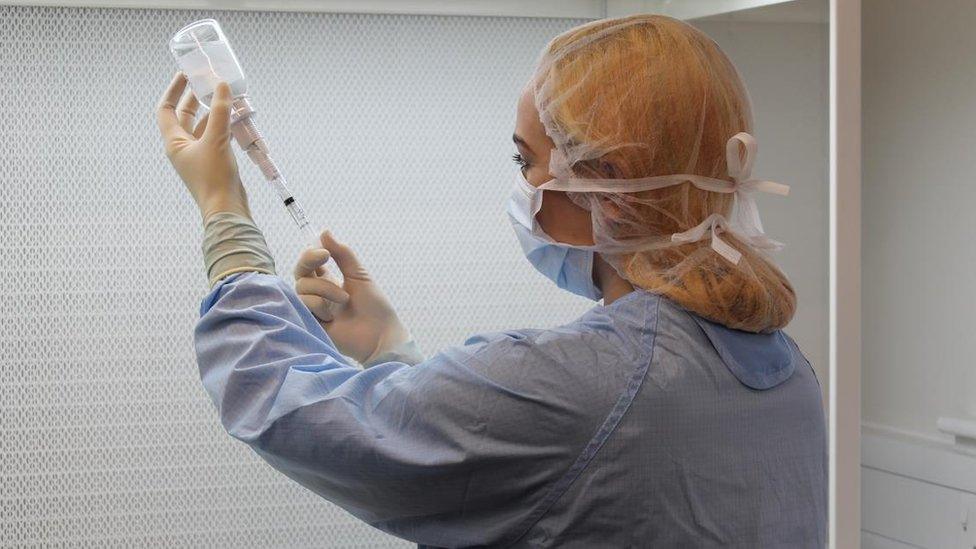Mobile ‘fix room’ begins operating in Glasgow
- Published
The fix room minibus set up for injecting drugs
A drug consumption van where addicts can inject heroin has been launched in Glasgow - despite warnings it could be breaking the law.
Peter Krykant, a recovering heroin addict and former drugs worker, has modified a minibus into a facility where he says addicts can safely take drugs under supervision.
He hopes it will help prevent overdoses and blood-borne viruses among users.
The UK government said it had no plans to introduce drug consumption rooms.
It added that anyone running such a facility would be committing offences including possession of a controlled drug and being concerned in the supply of a controlled drug.
There are nearly 500 injecting users in Glasgow city centre.
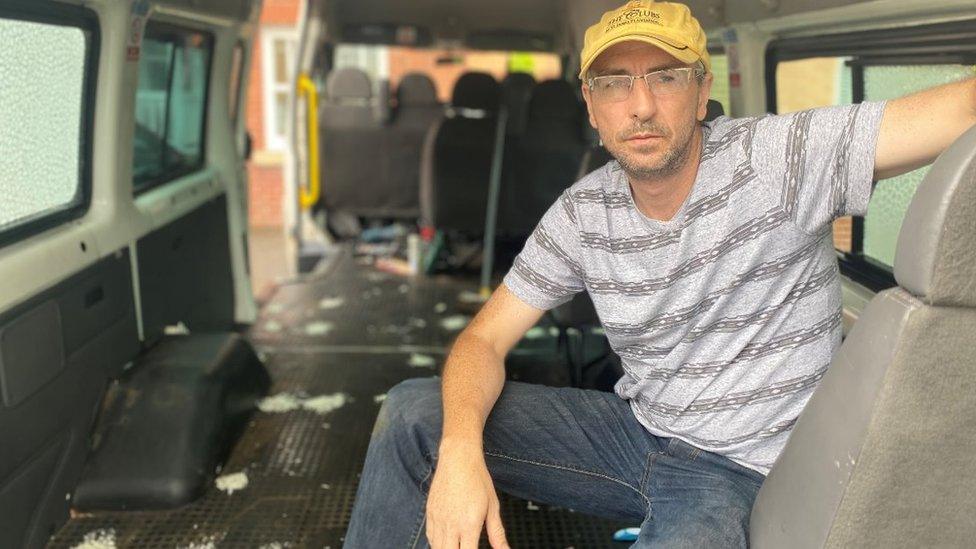
Mr Krykant bought the van after raising money with a crowd funder
Mr Krykant says homeless drug users are currently turning to "squalid" conditions.
He told BBC Scotland's The Nine: "I visited various hotspots for public injecting in Glasgow myself. You wouldn't want anybody in those conditions.
"People are using under bridges along the Clyde. You just need to look over the side and you'll see thousands of discarded needles, old sleeping bags…People are dying in those conditions.
"We say in Scotland we are treating drug addiction as a health problem, we say it's a public health emergency.
"Yet it's a pandemic that is ongoing that four people a day are currently on average dying in this country directly from a drug overdose.
"Inaction now, on my part, is contributing to those deaths."
Mr Krykant pressed ahead with the plan despite previous calls for a legal consumption room in the city being rejected by the UK Home Office.
It comes as Glasgow recovers from the worst HIV outbreak in Britain for 30 years and rising levels of drug-related death across Scotland.
He bought the vehicle online after raising £2,400 via a crowd funder. It contains clean needles and injecting equipment as well as doses of Naloxone - the life-saving drug that can reverse the effects of an opioid overdose.

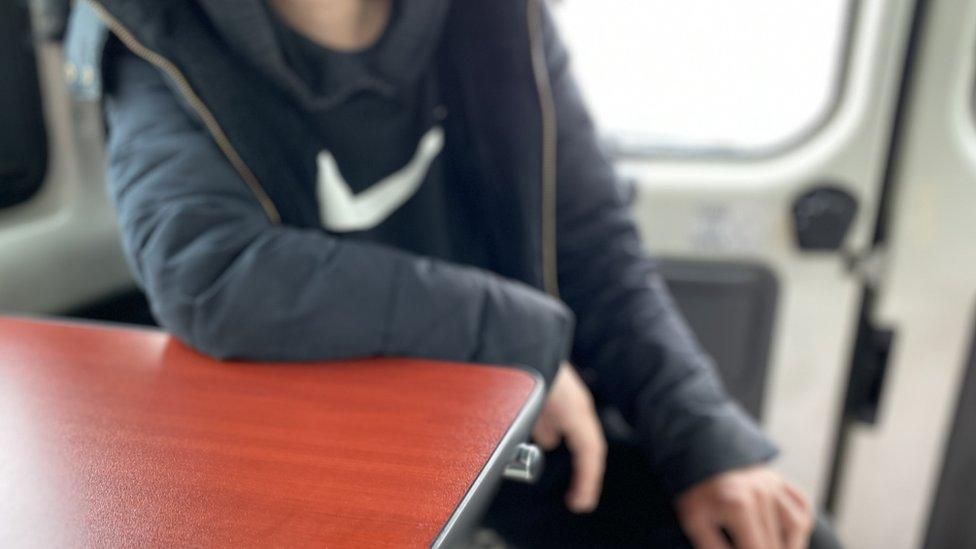
Drug users told BBC Scotland some of the places they take drugs are "disgusting"
'I usually do it anywhere out of sight'
Claire is 26, sleeps rough and has been injecting cocaine and heroin for five years.
She says her addiction has led her to take drugs in city centre alleyways littered with used needles.
She told The Nine: "I usually do it in a car park, or somewhere in the bushes. Anywhere I can find.
"Anywhere that's out of place, where the public can't see you.
"The places I've been in Glasgow, you wouldn't even think of. You go in and it's just disgusting."
She continued: "I've been there when someone has had an overdose. It's scary.
"They were just out of prison and they went for a charge, I was there. Next thing I knew they were on the ground, their face went white, lips went blue."
When asked if she worried about having an overdose, she said: "At the start, I did, but not now."

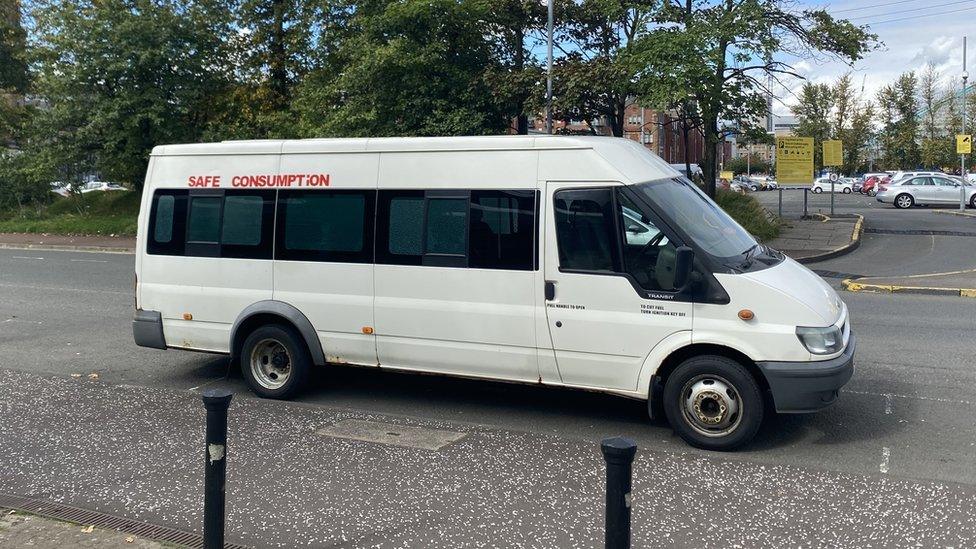
The drug consumption van was taken out on the streets of Glasgow for the first time this week
On the drugs consumption van's first outing on Monday, SNP MP Alison Thewliss and former Labour MP Paul Sweeney attended to show support.
Some users attended for information but none took illegal drugs.
Mr Krykant worked with people with drug and alcohol problems for three years and was involved in rapid testing homeless drug users for HIV last year.
"We could test somebody and give them a result within 10 minutes," he said.
"Most of the time a non-reactive or negative result, and we would walk away leaving them in that same place, knowing in my heart of hearts that they would be back at risk within that same day, back under a bridge, back in an alleyway. Sharing equipment and using in squalid conditions.
"I couldn't do it anymore."
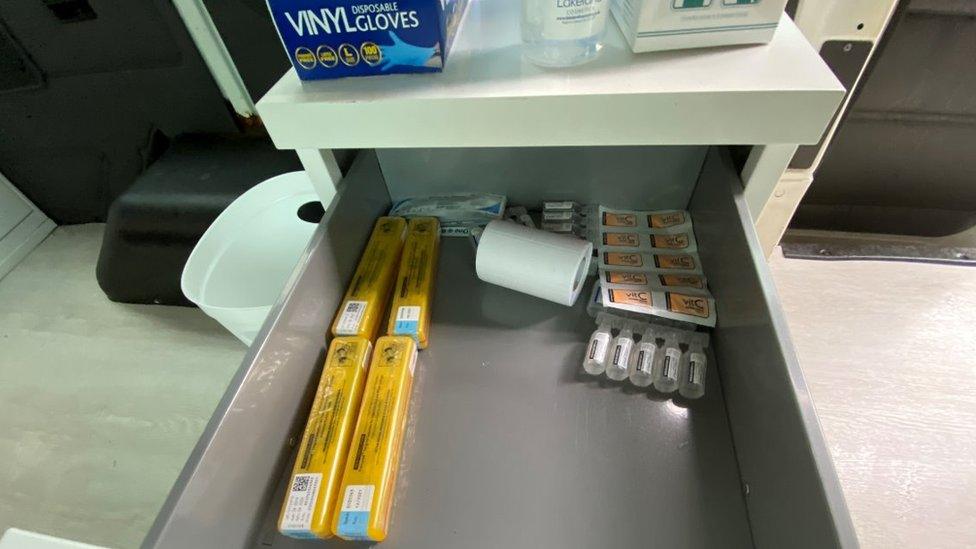
The van contains clean needles and injecting equipment as well as doses of Naloxone
Mr Krykant says the van is safe but has admitted it does not have the capability to test drugs any potential users may bring to inject.
He said: "I think it's a lot safer than someone using under a bridge. That's the simple reality.
"I am not condoning the use of that by taking the van out and I am not saying it is 100% safe.
"However, I'll take that risk of somebody injecting where I've got a Naloxone kit in order to reverse that opiate based overdose, rather someone injecting alone in squalid conditions under a bridge."
A UK government spokesman warned that anyone running drug consumption rooms could be committing "a range" of criminal offences.
It has no plans to introduce such facilities in the UK.
The spokesman said: "We continue to support a range of evidence-based approaches to reduce the health-related harms of drug misuse, such as maintaining the availability of needle and syringe programmes to prevent blood borne infections and widening the availability of naloxone to prevent overdose deaths."
Meanwhile Scotland's Drugs Deaths Taskforce said it "understands the motivations" behind safe drug consumption facilities but it could not support a proposal that did not offer a "clinically, physically and legally safe environment".
In a statement they added: "We do recognise the frustration and challenges in affected communities around this matter."

What is the legal position?
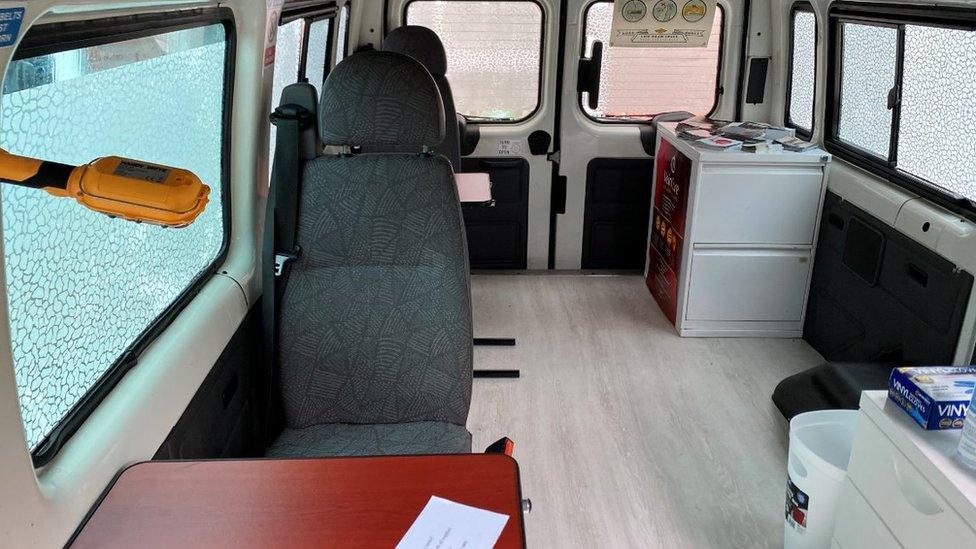
There is a no legal framework for such a facility in the UK
Mr Krykant could be in breach of the Misuse of Drugs Act by allowing illegal activity - the consumption of class-A drugs - in his vehicle.
Safer consumption facilities have been used in countries such as Canada, Denmark and the Netherlands.
However, there is a no legal framework for such a facility in the UK - despite calls by activists and health professionals.
In 2017, Glasgow's health and social care partnership proposed the introduction of a drug consumption room in the city.
However, this was ultimately rejected by the UK Government, which controls drug policy.
Mr Krykant's actions come as Scotland faces another record year for drug-related death.
Previously, the Scottish government called for more control over Scotland's drug policies to allow for initiatives such as injecting facilities.
But in February, UK policing minister Kit Malthouse told BBC Scotland such proposals were a "distraction".
- Published13 March 2020
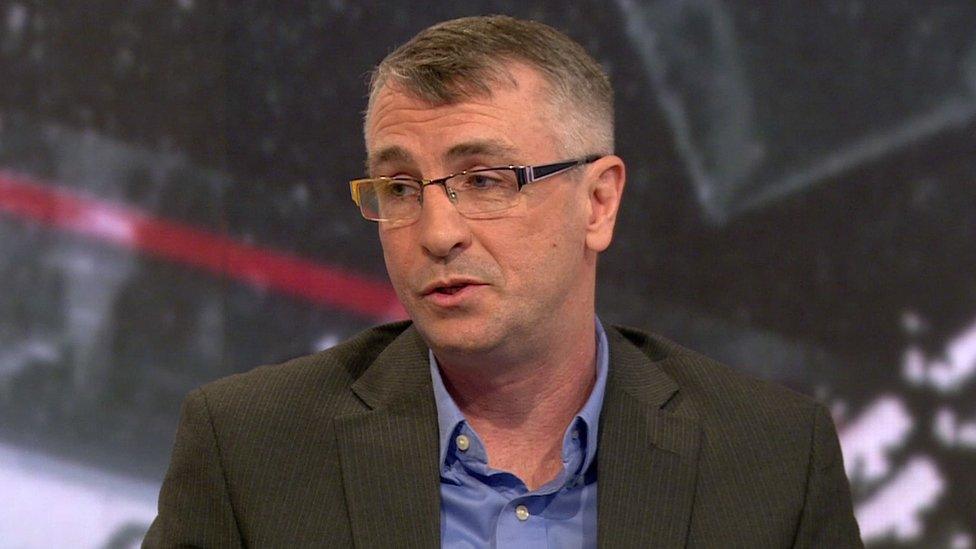
- Published7 March 2020
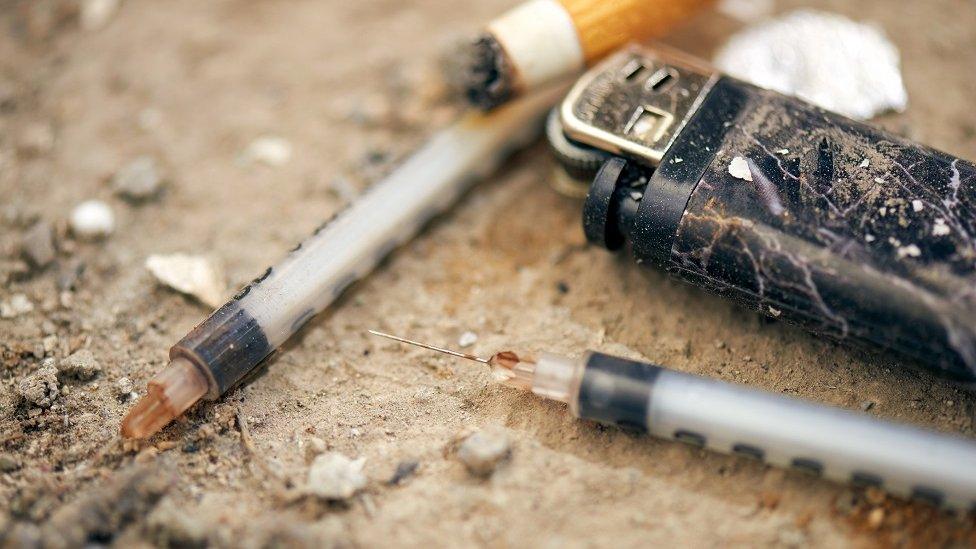
- Published30 July 2021
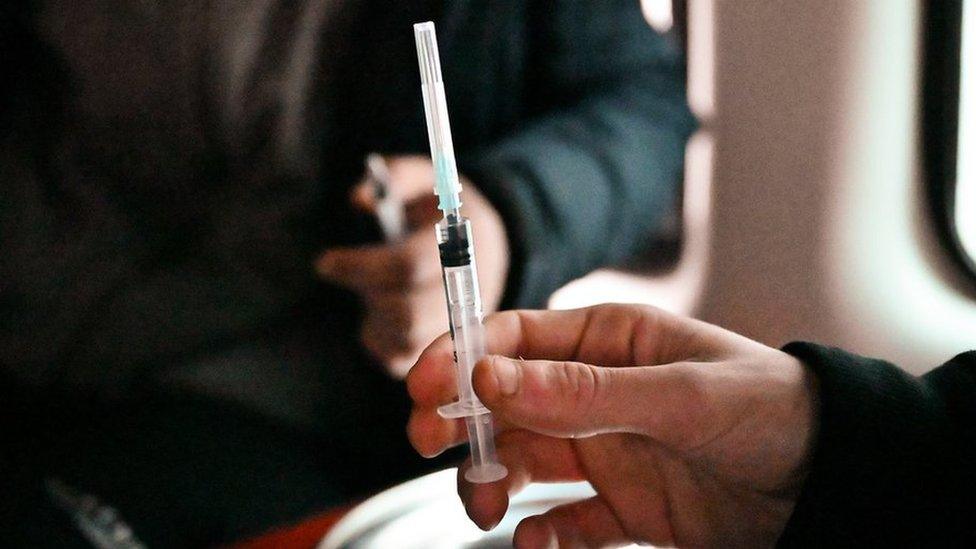
- Published26 November 2019
